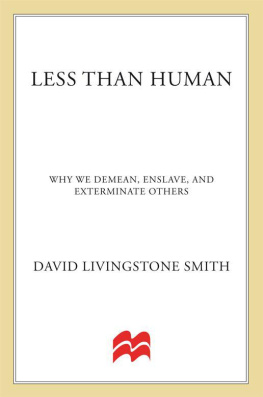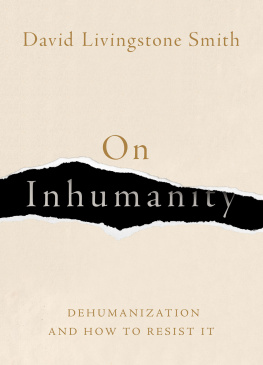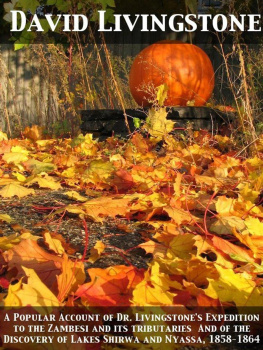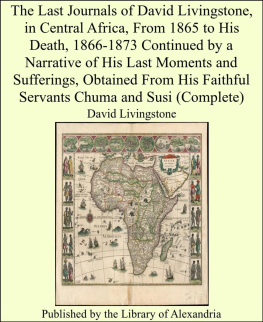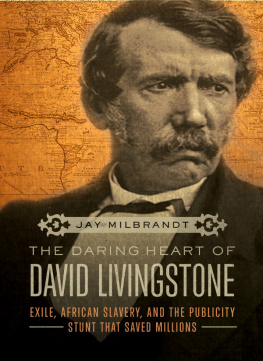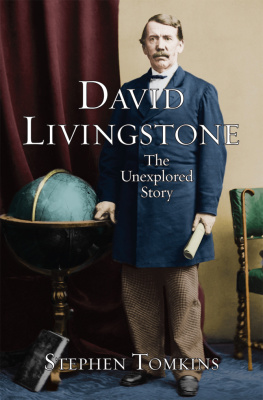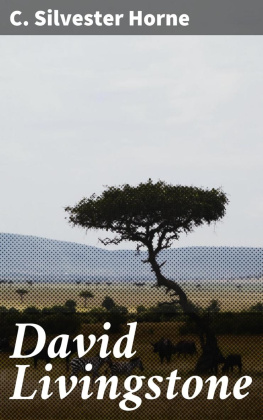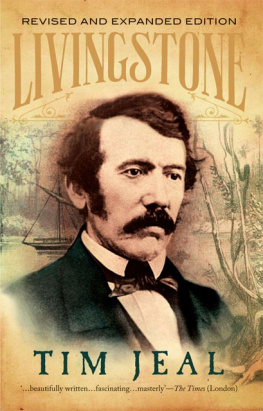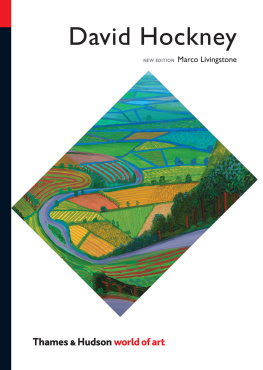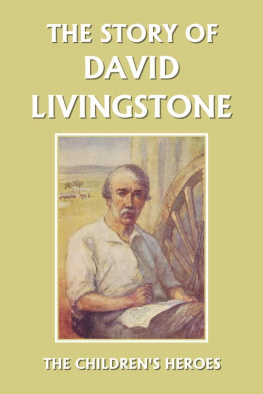David Livingstone Smith - Less Than Human: Why We Demean, Enslave, and Exterminate Others
Here you can read online David Livingstone Smith - Less Than Human: Why We Demean, Enslave, and Exterminate Others full text of the book (entire story) in english for free. Download pdf and epub, get meaning, cover and reviews about this ebook. publisher: St. Martins Press, genre: Religion. Description of the work, (preface) as well as reviews are available. Best literature library LitArk.com created for fans of good reading and offers a wide selection of genres:
Romance novel
Science fiction
Adventure
Detective
Science
History
Home and family
Prose
Art
Politics
Computer
Non-fiction
Religion
Business
Children
Humor
Choose a favorite category and find really read worthwhile books. Enjoy immersion in the world of imagination, feel the emotions of the characters or learn something new for yourself, make an fascinating discovery.
- Book:Less Than Human: Why We Demean, Enslave, and Exterminate Others
- Author:
- Publisher:St. Martins Press
- Genre:
- Rating:3 / 5
- Favourites:Add to favourites
- Your mark:
- 60
- 1
- 2
- 3
- 4
- 5
Less Than Human: Why We Demean, Enslave, and Exterminate Others: summary, description and annotation
We offer to read an annotation, description, summary or preface (depends on what the author of the book "Less Than Human: Why We Demean, Enslave, and Exterminate Others" wrote himself). If you haven't found the necessary information about the book — write in the comments, we will try to find it.
David Livingstone Smith: author's other books
Who wrote Less Than Human: Why We Demean, Enslave, and Exterminate Others? Find out the surname, the name of the author of the book and a list of all author's works by series.
Less Than Human: Why We Demean, Enslave, and Exterminate Others — read online for free the complete book (whole text) full work
Below is the text of the book, divided by pages. System saving the place of the last page read, allows you to conveniently read the book "Less Than Human: Why We Demean, Enslave, and Exterminate Others" online for free, without having to search again every time where you left off. Put a bookmark, and you can go to the page where you finished reading at any time.
Font size:
Interval:
Bookmark:

CONTENTS
PREFACE:
CHAPTER 1.
CHAPTER 2.
CHAPTER 3.
CHAPTER 4.
CHAPTER 5.
CHAPTER 6.
CHAPTER 7.
CHAPTER 8.
CHAPTER 9.
APPENDIX I:
APPENDIX II:
ACKNOWLEDGMENTS
THIS BOOK WAS DIFFICULT TO WRITE, and I couldnt have completed it without the help of many people. I owe most to my wife, Subrena Smith, whose incisive comments and exacting intellectual standards kept bouts of intellectual enthusiasm from descending into sloppy reasoning. She has helped me avoid many errors and oversights, and her unflagging concern for my well-being gave me the mental and physical space to concentrate on research and writing.
I wouldnt have considered undertaking this project were it not for the urgings of my friend and colleague Anouar Majid, who insisted that I should devote my energies to investigating dehumanization at a time when I was considering various possible projects, and was uncertain which one to choose. Youve got to do it, David! he said to me enthusiastically over dinner one evening. Everyone talks about dehumanization, but hardly anyone theorizes it. As I soon discovered, he was absolutely right.
The book that you are reading now would have been nowhere near as readable had it not been for the efforts of Bruce Schneier, who carefully scrutinized and insightfully commented on the penultimate (or rather pen-penultimate) draft of the manuscript.
I would also like to give heartfelt thanks to my literary agent Michael Psaltis, and my editor at St. Martins Press, Daniela Rapp, who displayed superhuman patience accommodating my trail of broken promises (Ill get the manuscript to you in three months, for certain ). Finally, Id like to thank all the library staff at the University of New England, who promptly and efficiently responded to my seemingly interminable requests for books and journal articles.
In addition to these individuals, there are many others who have contributed to the writing of this book by generously sharing their ideas, clarifying facts, and directing me to sources of information, including Zadie Beagle, Vahan Dadian, Raymond Evans, Daniel Gilbert, Chris Hedges, Karl Jacoby, Scott MacDonald, David Mandel, Laura Mueller, Paul Roscoe, Michael Sargent, Wolfgang Wagner, Adam Waytz, Charlotte Witt, and Richard Wrangham. Thanks to you all.
I understand
what you want your filthy slave to be. I am
your barbarian, your terrorist;
your monster.
ALI ALIZADEH , YOUR TERRORIST
PREFACE
CREATURES OF A KIND SOMEWHAT INFERIOR
We hold these truths to be self-evident, that all men are created equal, that they are endowed by their Creator with certain unalienable Rights, that among these are Life, Liberty and the pursuit of Happiness.
THOMAS JEFFERSON, UNITED STATES DECLARATION OF INDEPENDENCE
THESE THIRTY-FIVE WORDS ARE OFTEN QUOTED reverently. The ideal that they expressthe principle that all men (that is, all human beings) have certain basic rights just because they are human is easy to resonate with, and to applaud. But Jeffersons words beg a vexing question: the question of who, exactly, should be counted as human.
Jeffersons contemporaries werent certain.
It wasnt just the highbrows who thought of blacks as less than human. The theoretical views of the intellectualsthe philosophers, statesmen, and politiciansmerged seamlessly with ideological beliefs which, however poorly articulated, had long been entrenched in the popular consciousness. Thus, the pseudonymous author of Two Dialogues on the Man-Trade, an abolitionist tract published in 1760, observed that:
[T]hose who are concerned in the Man Trade have a confused imagination, or half formed thought, in their minds, that the Blacks are hardly of the same Species with the white Men, but are Creatures of a Kind somewhat inferior
I do not know how to think that any white Men could find it in their Hearts, the author continued, that the common Sentiments of Humanity would permit them to treat the black Men in that cruel, barbarous Manner in which they do treat them, did they think and consider that these have rational, immortal Souls. Subhumans, it was believed, are beings that lack that special something that makes us human. Because of this deficit, they dont command the respect that we, the truly human beings, are obliged to grant one another. They can be enslaved, tortured, or even exterminatedtreated in ways in which we could not bring ourselves to treat those whom we regard as members of our own kind.
This phenomenon is called dehumanization. It is the subject of this book.
Before I began to investigate dehumanization, I assumed that there was substantial research literature devoted to it. The fact that dehumanization is mentioned so frequently, both in popular journalism and in academic writings, led me to believe (wrongly, it turned out) that it had already been extensively studied. Then, as I began to hunt for writings on dehumanization, it dawned on me that although scholars from a wide range of disciplines are convinced that dehumanization plays a crucial role in war, genocide, and other forms of brutality, writings on the subject are shockingly thin on the ground. I found that its usually mentioned only in passinga page here, or a paragraph there. Apart from a few dozen articles by social psychologists, there is scarcely any literature on it at all. If dehumanization really has the significance that scholars claim, then untangling its dynamics ought to be among our most pressing priorities, and its neglect is as perplexing as it is grave. I wrote this book to bring dehumanization out of the shadows, and to jump-start a conversation that is centuries overdue. To do this, Ive drawn from a rich palette of sourcesincluding history, psychology, philosophy, biology, and anthropologyto paint a portrait of dehumanization and the forces and mechanisms that sustain it.
Its sometimes said that dehumanization is a social construction thats at most a few centuries old. According to this story, dehumanization was, paradoxically, a child of the doctrine of universal human rights. This idea was the moral and political touchstone of the Enlightenment, but it conflicted with the brutal colonialism perpetrated by Europeans. As the example with which I began this chapter suggests, the dissonance between theory and practice was resolved by denying the humanity of the oppressed.
This story expresses a truth, but it is a partial truth that obfuscates the real nature, history, and extent of the dehumanizing impulse. Dehumanization is neither uniquely European nor uniquely modern. It is far more widespread, vastly more ancient, and more profoundly intertwined with the human experience than the constructionist view allows. To understand its workings, its not good enough to examine some contingent facts about a particular historical period. We must look much deeper.
Of course, particular manifestations of dehumanization are social constructions, in the sense that they appear in a given culture and historical epoch which leave their distinctive stamp on it. Eighteenth-century Europeans embraced a certain type of dehumanization, but so did the Athenians during the fourth century before Christ, the Germans of the 1930s and 40s, and the Eipo tribesmen of highland New Guinea, who refer to their enemies as dung flies, lizards, and worms.
In this book, I will argue that dehumanization is a joint creation of biology, culture, and the architecture of the human mind. Grasping its nature and dynamics requires that we attend to all three elements. Excluding any of them leaves us with a hopelessly distorted picture of what we are trying to comprehend.
Dehumanization is too important a topic to be left to the experts, so Ive tried to make this book appealing and accessible to a broad general readership while at the same time addressing the concerns of specialist scholars in several disciplines. In doing this, Ive done my best to balance academic rigor with engaging prose, on the principle that anything worth explaining is worth explaining in a clear and interesting way. In general, Ive avoided technical jargon as much as possible, and have included explanations on the occasions when its use was unavoidable. However, there are a couple of exceptions to this rule. There are two ordinary words that I sometimes use in out-of-the-ordinary ways. The words are person and human . This isnt a self-indulgent plunge into academic obscurity. Its motivated by the need for a vocabulary to capture ideas that are hard to put into ordinary speech.
Next pageFont size:
Interval:
Bookmark:
Similar books «Less Than Human: Why We Demean, Enslave, and Exterminate Others»
Look at similar books to Less Than Human: Why We Demean, Enslave, and Exterminate Others. We have selected literature similar in name and meaning in the hope of providing readers with more options to find new, interesting, not yet read works.
Discussion, reviews of the book Less Than Human: Why We Demean, Enslave, and Exterminate Others and just readers' own opinions. Leave your comments, write what you think about the work, its meaning or the main characters. Specify what exactly you liked and what you didn't like, and why you think so.

